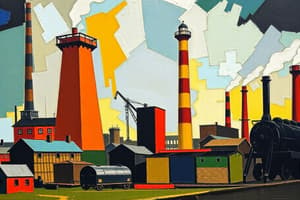Podcast
Questions and Answers
Which of the following best describes the Industrial Revolution?
Which of the following best describes the Industrial Revolution?
- A social movement advocating for rural lifestyles.
- A political movement focused on overthrowing monarchies.
- A period of minor technological advancements in agriculture.
- A change in technology that transformed the way people worked and lived. (correct)
What is a key characteristic of a revolution?
What is a key characteristic of a revolution?
- A return to traditional practices and values.
- A gradual and subtle shift in societal norms.
- A period of minimal change focused on maintaining stability.
- A dramatic and wide-ranging change in the way something works. (correct)
Before the Industrial Revolution, how did most people in Britain live?
Before the Industrial Revolution, how did most people in Britain live?
- As wealthy merchants trading overseas.
- In large cities with advanced infrastructure.
- In rural areas, working on small farms. (correct)
- As nomadic hunter-gatherers.
What was a common characteristic of the working day for most people before the Industrial Revolution?
What was a common characteristic of the working day for most people before the Industrial Revolution?
What significant demographic change occurred in Britain during the Industrial Revolution?
What significant demographic change occurred in Britain during the Industrial Revolution?
Which of the following developments was NOT a feature of Britain's transformation during the Industrial Revolution?
Which of the following developments was NOT a feature of Britain's transformation during the Industrial Revolution?
What social class emerged and expanded as a result of the growth of cities and industries during the Industrial Revolution?
What social class emerged and expanded as a result of the growth of cities and industries during the Industrial Revolution?
What was a key driver of increased demand during the Industrial Revolution?
What was a key driver of increased demand during the Industrial Revolution?
What did the rise of the 'middle class' during the Industrial Revolution affect?
What did the rise of the 'middle class' during the Industrial Revolution affect?
In what ways did the Industrial Revolution affect where people lived and worked in Britain?
In what ways did the Industrial Revolution affect where people lived and worked in Britain?
What impact did improved living standards and declining death rates have on Britain’s population during the Industrial Revolution?
What impact did improved living standards and declining death rates have on Britain’s population during the Industrial Revolution?
Before the Industrial Revolution, travel was primarily on foot or by horse because...
Before the Industrial Revolution, travel was primarily on foot or by horse because...
What characterized British society in the early 1700s, prior to the Industrial Revolution?
What characterized British society in the early 1700s, prior to the Industrial Revolution?
Before the Industrial Revolution, most farms produced just enough food to...
Before the Industrial Revolution, most farms produced just enough food to...
The Industrial Revolution is best characterized as which of the following types of change?
The Industrial Revolution is best characterized as which of the following types of change?
Which of the following is the most accurate definition of a revolution?
Which of the following is the most accurate definition of a revolution?
Prior to industrialization, roads were...
Prior to industrialization, roads were...
What was the nature of British society in the early 1700s concerning movement?
What was the nature of British society in the early 1700s concerning movement?
What best summarizes the main reasons the Industrial Revolution began in Britain?
What best summarizes the main reasons the Industrial Revolution began in Britain?
The growth of industries during the Industrial Revolution did NOT lead to which of the following?
The growth of industries during the Industrial Revolution did NOT lead to which of the following?
Flashcards
Industrial Revolution
Industrial Revolution
A change in technology that transformed the way people worked and lived.
Revolution (political)
Revolution (political)
Forcible overthrow of a government or social order in a new system.
Revolution (general)
Revolution (general)
Dramatic and wide-ranging change in the way something works or is organized or in people's ideas about it.
Pre-Industrial Britain
Pre-Industrial Britain
Signup and view all the flashcards
Population Growth in Britain
Population Growth in Britain
Signup and view all the flashcards
Transformation of Britain
Transformation of Britain
Signup and view all the flashcards
Rise of the Middle Class
Rise of the Middle Class
Signup and view all the flashcards
Impact of the Middle Class
Impact of the Middle Class
Signup and view all the flashcards
Study Notes
- The Industrial Revolution brought about technological changes, transforming how people worked and lived.
- The Industrial Revolution is defined as a dramatic and wide-ranging shift in the way things operate, are organized or in people's thought.
Industrial Revolution in Britain
- In the early 1700s, Britain was primarily an agricultural society.
- Most people resided and worked on small farms in rural areas.
- These farms mainly produced sufficient food from crops and livestock to sustain local villages.
- Working days typically started at sunrise and ended at sunset for most individuals.
- Roads were in poor condition, and the majority traveled by foot or horse.
- Most individuals rarely ventured far from their villages.
The Industrial Revolution Begins
- Britain's population quadrupled between 1750 and 1850, increasing from an estimated 6.5 million to over 27.5 million due to improved living standards and declining death rates.
- British society transitioned from rural to urban, with the development of factories, textile mills, modern towns and cities, new power sources, and improved transport and communications.
- The growth of cities and industries saw the rise of the middle class who were neither wealthy aristocratic landowners nor impoverished factory workers, including industrialists, merchants, bankers, shopkeepers, doctors, lawyers, managers, clerks, and government officials.
- The middle class drove the demand for mass-produced consumer goods and for more schools, universities and libraries.
Studying That Suits You
Use AI to generate personalized quizzes and flashcards to suit your learning preferences.




